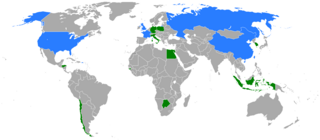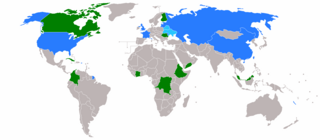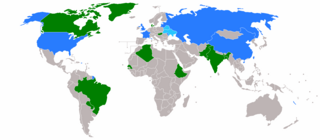
The United Nations Regional Groups are the geopolitical regional groups of member states of the United Nations. Originally, the UN member states were unofficially organized into five groups as an informal means of sharing the distribution of posts for General Assembly committees. Now this grouping has taken on a much more expansive and official role. Many UN bodies are allocated on the basis of geographical representation. Top leadership positions, including Secretary-General and President of the General Assembly, are rotated among the regional groups. The groups also coordinate substantive policy and form common fronts for negotiations and bloc voting.

The 2006 United Nations Security Council election began on 16 October 2006 during the 61st session of the United Nations General Assembly, held at United Nations Headquarters in New York City. The elections were for five non-permanent seats on the Security Council for two-year mandates commencing on 1 January 2007.

The 2007 United Nations Security Council election was held on 16 October 2007 during the 62nd session of the United Nations General Assembly, held at UN Headquarters in New York City. The elections were for five non-permanent seats on the UN Security Council for two-year mandates commencing on 1 January 2008.
The 2008 United Nations Security Council election was held on 17 October 2008 during the 63rd session of the United Nations General Assembly at United Nations Headquarters in New York City. The elections were held for five non-permanent seats on the UN Security Council for two-year mandates commencing on 1 January 2009.

The 1998 United Nations Security Council election was held on 8 October 1998 at United Nations Headquarters in New York City during the 53rd session of the United Nations General Assembly. The General Assembly elected five non-permanent members of the UN Security Council for two-year terms commencing on 1 January 1999.

The 1997 United Nations Security Council election was held on 14 October 1997 at United Nations Headquarters in New York City during the 52nd session of the United Nations General Assembly. The General Assembly elected five non-permanent members of the UN Security Council for two-year terms commencing on 1 January 1998.

The 1996 United Nations Security Council election was held on 21 October 1996 at United Nations Headquarters in New York City during the 51st session of the United Nations General Assembly. The General Assembly elected five non-permanent members of the UN Security Council for two-year terms commencing on 1 January 1997.

The 1995 United Nations Security Council election was held on 8 November 1995 at United Nations Headquarters in New York City during the 50th session of the United Nations General Assembly. The General Assembly elected five non-permanent members of the UN Security Council for two-year terms commencing on 1 January 1996.

The 2002 United Nations Security Council election was held on 27 September 2002 at United Nations Headquarters in New York City during the 57th session of the United Nations General Assembly. The General Assembly elected five non-permanent members of the UN Security Council for two-year terms commencing on 1 January 2003.

The 2000 United Nations Security Council election was held on 10 October 2000 at United Nations Headquarters in New York City during the 55th session of the United Nations General Assembly. The General Assembly elected five non-permanent members of the UN Security Council for two-year terms commencing on 1 January 2001.

The 1993 United Nations Security Council election was held on 29 October 1993 during the Forty-eighth session of the United Nations General Assembly, held at United Nations Headquarters in New York City. The General Assembly elected Argentina, the Czech Republic, Nigeria, Oman, and Rwanda, as the five new non-permanent members of the UN Security Council for two-year mandates commencing on 1 January 1994. Oman and Rwanda were elected for the first time ever, while the Czech Republic was elected for the first time as a separate country after the dissolution of Czechoslovakia.

The sixty-seventh session of the United Nations General Assembly opened on 18 September 2012 and had its last scheduled meeting on 11 September 2013. The president of the United Nations General Assembly was chosen from the EEG with Serbia's then foreign minister Vuk Jeremić beating out Lithuania's Dalius Čekuolis in an election. Notably, the session led to United Nations General Assembly resolution 67/19 which granted Palestine non-member observer state status.

The 1989 United Nations Security Council election was held on 18 October 1989 during the Forty-fourth session of the United Nations General Assembly, held at UN Headquarters in New York City. The General Assembly elected Côte d'Ivoire, Cuba, Romania, South Yemen, and Zaire, as the five new non-permanent members of the UN Security Council for two-year mandates commencing on 1 January 1990. This was the first time Yemen was elected to the Council, as Yemeni unification occurred during South Yemen membership.

The 1984 United Nations Security Council election was held from 22 October to 18 December 1984 during the Thirty-ninth session of the United Nations General Assembly, held at United Nations Headquarters in New York City. The General Assembly elected Australia, Denmark, Madagascar, Thailand, and Trinidad and Tobago, as the five new non-permanent members of the UN Security Council for two-year mandates commencing on 1 January 1985. Madagascar, Thailand and Trinidad and Tobago were elected to Council for the first time.

The 1975 United Nations Security Council election was held from 20 October to 23 October 1975 during the Thirtieth session of the United Nations General Assembly, held at United Nations Headquarters in New York City. The General Assembly elected Dahomey, Libya, Pakistan, Panama, and Romania, as the five new non-permanent members of the UN Security Council for two-year mandates commencing on 1 January 1976. Benin and Libya were elected for the first time.

The 1973 United Nations Security Council election was held on 15 October 1973 during the Twenty-eighth session of the United Nations General Assembly, held at United Nations Headquarters in New York City. The General Assembly elected the Byelorussian SSR, Cameroon, Costa Rica, Iraq, and Mauritania, as the five new non-permanent members of the UN Security Council for two-year mandates commencing on 1 January 1974. This was the first election of Cameroon, Costa Rica and Mauritania and the only election of Byelorussian SSR into the council.

The 1971 United Nations Security Council election was held on 23 November 1971 during the Twenty-sixth session of the United Nations General Assembly, held at United Nations Headquarters in New York City. The General Assembly elected Guinea, India, Panama, Sudan, and Yugoslavia, as the five new non-permanent members of the UN Security Council for two-year mandates commencing on 1 January 1972. It was the first election of Guinea and Sudan into the council.

The 1969 United Nations Security Council election was held on 20 October 1969 during the Twenty-fourth session of the United Nations General Assembly, held at United Nations Headquarters in New York City. The General Assembly elected the Burundi, Nicaragua, Poland, Sierra Leone, and Syria, as the five new non-permanent members of the UN Security Council for two-year mandates commencing on 1 January 1970. It was the first time Burundi, Nicaragua and Sierra Leone were elected members of the council.

The 1967 United Nations Security Council election was held on 6 November 1967 during the Twenty-second session of the United Nations General Assembly, held at United Nations Headquarters in New York City. The General Assembly elected Algeria, Hungary, Pakistan, Paraguay, and Senegal, as the five new non-permanent members of the UN Security Council for two-year mandates commencing on 1 January 1968. Algeria and Senegal saw their first election into the council.
The 1959 United Nations Security Council election was held between 12 October and 12 December during the fourteenth session of the United Nations General Assembly, held at United Nations Headquarters in New York City. The General Assembly elected three members through consultation of the president, as non-permanent members of the UN Security Council for two-year mandates commencing on 1 January 1960.


















